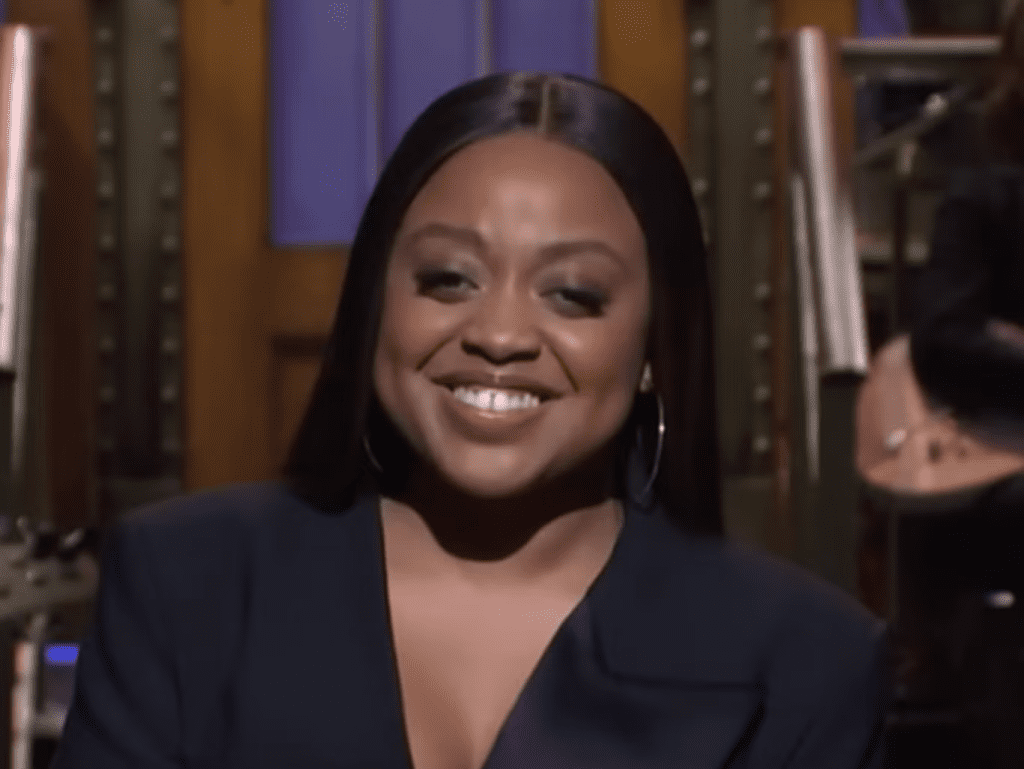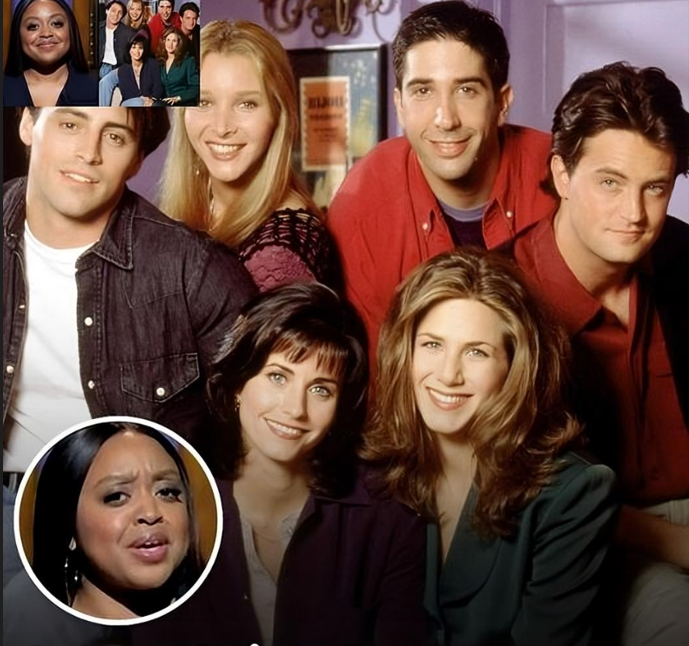Quinta Brunson, the Emmy Award-winning creator and star of the critically acclaimed sitcom Abbott Elementary, recently took the stage as the host of Saturday Night Live (SNL). Her opening monologue quickly became the talk of the internet, thanks to a sharp yet humorous critique of the lack of diversity in the beloved 90s sitcom Friends. With her signature wit and authenticity, Brunson delivered a bold message that resonated far beyond the comedy stage, sparking important conversations about representation in television.

Brunson’s Opening Monologue: A Striking Comparison
Brunson kicked off her monologue by introducing Abbott Elementary to those who might not be familiar with it. She described it as a “network sitcom, like Friends.” However, she didn’t stop there. With impeccable timing, she added:
“Except, instead of being about a group of friends, it’s about a group of teachers. Instead of New York, it’s in Philadelphia, and instead of not having Black people, it does.”
The comment was met with uproarious laughter and resounding applause from the live audience. It was a statement that humorously pointed out the elephant in the room: Friends, a sitcom set in one of the most diverse cities in the world, often failed to reflect that diversity.
The Long-Standing Criticism of Friends
Since its debut in 1994, Friends has been celebrated as one of the most iconic sitcoms of all time. Its portrayal of six close-knit friends navigating life, love, and careers in New York City captivated audiences worldwide. However, the show has also faced persistent criticism for its glaring lack of diversity.
Despite being set in New York—a melting pot of cultures—the show’s main cast consisted entirely of white actors, and recurring characters of color were virtually nonexistent. This absence raised eyebrows for years, with many arguing that Friends failed to reflect the realities of urban life.
The show’s co-creator, Marta Kauffman, later acknowledged this criticism. In a 2022 interview, Kauffman admitted it “took [her] a long time to begin to understand how [she] internalized systemic racism.” In response, she donated $4 million to establish an endowed chair for African and African American studies at Brandeis University, her alma mater. While this gesture was widely praised, the issue of representation in classic shows like Friends remains a point of discussion.
Why Brunson’s Comments Hit Home
Quinta Brunson’s monologue struck a chord for a reason: Abbott Elementary has become a modern counterpoint to shows like Friends. Unlike its predecessor, Abbott Elementary centers around a predominantly Black school in Philadelphia and features a diverse cast of characters that reflect real-world communities.
Brunson’s ability to blend humor with biting social commentary highlights a larger issue within Hollywood: the systemic lack of representation for marginalized communities. While Friends remains a cultural cornerstone, its shortcomings emphasize how far the entertainment industry has come—and how much further it still needs to go.
The Success and Representation of Abbott Elementary
Abbott Elementary has been widely praised for its authentic storytelling and diverse representation. The show doesn’t rely on stereotypes; instead, it highlights the lives, struggles, and triumphs of teachers working in an underfunded public school system. Brunson’s vision for the series brings warmth, humor, and an important cultural perspective to network television.
Characters like Janine Teagues (played by Brunson herself), Principal Ava Coleman (Janelle James), and Barbara Howard (Sheryl Lee Ralph) are relatable, well-rounded, and reflect the rich diversity often missing from mainstream shows.
This representation matters. It allows audiences of all backgrounds to see themselves on screen, fostering a connection to the stories being told. It also opens doors for meaningful conversations about equity, education, and inclusion in both media and real life.

Social Media’s Response: Applause and Agreement
Brunson’s remarks quickly went viral on social media. Viewers praised her for using her SNL platform to shine a light on an issue that remains relevant today.
Many users applauded her boldness and humor:
- “Quinta Brunson saying what we’ve all been thinking about Friends for years. She’s a genius!”
- “Representation matters, and Quinta just nailed it in one sentence. Bravo!”
- “Friends is iconic, but let’s be honest—it never reflected the real New York. Abbott Elementary does diversity right.”
Others took the opportunity to reflect on the evolving landscape of television, pointing out how shows like Abbott Elementary are helping redefine representation for the better.
The Changing Face of Television
Quinta Brunson’s success with Abbott Elementary and her viral SNL moment reflect a broader shift in the entertainment industry. In recent years, audiences have demanded more diverse and inclusive stories, and creators like Brunson have delivered.
Shows like Insecure, Black-ish, Atlanta, and Abbott Elementary are proof that diverse storytelling can be both critically acclaimed and commercially successful. These shows don’t just fill a representation gap—they enrich television by offering fresh perspectives, untold stories, and genuine cultural relevance.
The entertainment industry is finally beginning to recognize that inclusion isn’t just a buzzword; it’s essential for creating content that resonates with today’s audiences. Brunson’s comparison of Abbott Elementary to Friends highlights the progress being made while reminding us of the work that still lies ahead.
Quinta Brunson: A Voice for Change in Hollywood
Quinta Brunson’s rise to stardom has been nothing short of extraordinary. From her early days creating viral content to becoming the Emmy Award-winning powerhouse behind Abbott Elementary, she has solidified herself as a trailblazer in modern television.
Her willingness to address uncomfortable topics—whether through comedy or conversation—demonstrates her commitment to driving meaningful change. By using platforms like Saturday Night Live, Brunson challenges the status quo, reminding audiences and industry leaders of the power of representation.
Conclusion: The Impact of Quinta Brunson’s Viral Moment
Quinta Brunson’s SNL monologue was far more than a comedic jab—it was a powerful statement about diversity, representation, and progress in television. By comparing Abbott Elementary to Friends, Brunson not only highlighted the shortcomings of a beloved classic but also celebrated the strides being made today.
Her comments resonated deeply with audiences because they reflected a truth that’s impossible to ignore: television is at its best when it reflects the richness of the world around us. Shows like Abbott Elementary are paving the way for a more inclusive future, and creators like Quinta Brunson are leading the charge.
As we celebrate her success and the impact of her words, one thing is clear: Quinta Brunson isn’t just changing the conversation—she’s changing the game.

